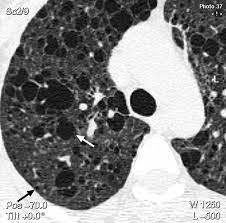 A progressive cystic lung disease in women.
A progressive cystic lung disease in women.
Associated with inappropriate activation of mammalian target of rapamycin (m-TOR) signaling that regulates cellular growth and lymphangiogenesis.
Associated with chylous pleural effusions, abdominal tumors and renal angiomyolipomas.
A low grade malignancy that targets the lung.
Occurs sporadically in 5 women per million, and affects 30-40% of women with tuberous sclerosis complex.
Associated with progressive deterioration in FEV1, respiratory impariment, pneumothoraces, and the development of hypoxia.
Associated with pulmonary infiltration of benign smooth muscle cells which circulate in the blood and have biallelic tuberous sclerosis gene mutations.
Lymphangioleimyomatosis cells express growth factors, vascular endothelial growth factor C and vascular endothelial growth factor D and can spread through lymph vessels.
Tuberous sclerosis complex gene function activates mTOR signaling pathway functions of growth motility and survival.
Sirolimus (rapamycin) blocks mTOR activation of downstrean kinases and restores functions in cells with defective tuberous slerosis complex gene function.
Sirolimus stabilizes pulmonary function, reduced VEGF-D levels, with improved quality of life and a reduction in symptoms (McCormack FX et al).
